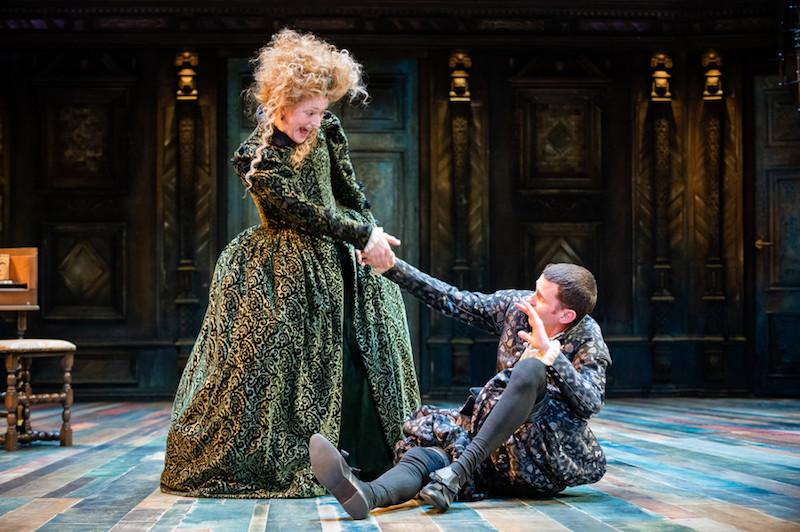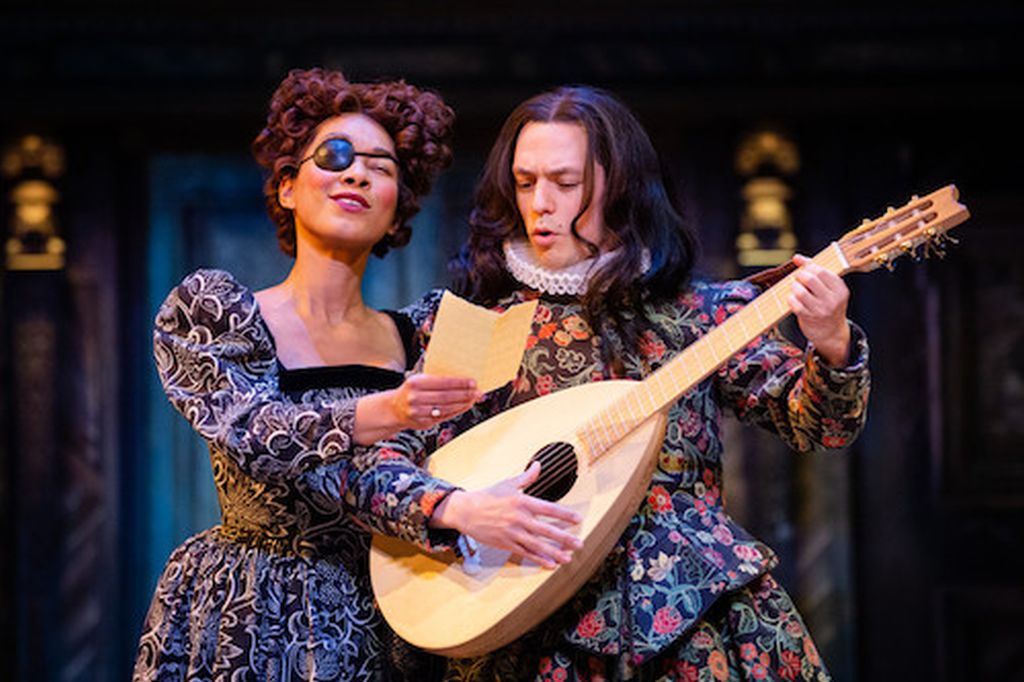The Taming of the Shrew, Barbican review - different but still problematic | reviews, news & interviews
The Taming of the Shrew, Barbican review - different but still problematic
The Taming of the Shrew, Barbican review - different but still problematic
Gender changes provide a new perspective on the balance of power

This is one play by Shakespeare ripe for tinkering. It's well nigh impossible now to take it at face value and still find romance and fun in the bullying: the physical and psychological abuse as a supposedly problematic wife is "tamed" into submission. And there have been experiments.
If something radical isn't done, there has to be a heroic effort on the part of the actor playing Katherine: having equalled Petruchio in wit and suffered humiliation and abuse, she emerges the ironic winner in the final trial scene, even falling in love with her controller - or else she is utterly crushed by the misogynistic rules of society. Otherwise, the Induction, the introductory story of drunkard Christopher Sly, might just allow the main action to be an outrageous dream sequence experienced by an poor alcoholic sod who is made the butt of some posh boy's practical joke. With luck, whatever line is taken, some of the comedy might survive.
 In this Royal Shakespeare Company production, first seen in Stratford, director Justin Audibert goes for broke. He dispenses with the Sly story but keeps Shakespeare's language (given a few gender-changed nouns and pronouns), investing authority and power entirely in the women. Mother Baptista is trying to marry off her two boys, recalcitrant Katherine and sweetly submissive Bianco. (Names are changed to fit, except for Katherine's). Along comes attractive, strong-willed, rough-tongued Petruchia and the usual plot unfolds with genders swapped. It's a timely experiment and one which does offer a different perspective (and a welcome opportunity for far more female actors than usual) but there are difficulties. For one thing, we are left with the original problem: someone, albeit a man, is very badly treated and obliged to behave according to another's will while still apparently enjoying a happy ending. Abuse is just as unattractive when the abuser is a woman.
In this Royal Shakespeare Company production, first seen in Stratford, director Justin Audibert goes for broke. He dispenses with the Sly story but keeps Shakespeare's language (given a few gender-changed nouns and pronouns), investing authority and power entirely in the women. Mother Baptista is trying to marry off her two boys, recalcitrant Katherine and sweetly submissive Bianco. (Names are changed to fit, except for Katherine's). Along comes attractive, strong-willed, rough-tongued Petruchia and the usual plot unfolds with genders swapped. It's a timely experiment and one which does offer a different perspective (and a welcome opportunity for far more female actors than usual) but there are difficulties. For one thing, we are left with the original problem: someone, albeit a man, is very badly treated and obliged to behave according to another's will while still apparently enjoying a happy ending. Abuse is just as unattractive when the abuser is a woman.
As Petruchia, Claire Price fizzes with sunny energy, however, and the women generally fare well. As Bianco's older suitor, Gremia, Sophie Stanton seems to glide on comic casters and Laura Elsworthy's Trania relishes the opportunities provided by standing in for her mistress, Lucentia, putting on an exaggerated upper class accent and thrusting her arms in the air, a winner - for the moment. The men have a tougher time bridging the gap. Joseph Arkley's Katherine is more quickly tamed than most female equivalents. In his final speech of submission - which moves Petruchia to whisk him off to bed - he seems to stand outside the action, to be apologising for the patriarchy. As Bianco, James Cooney (above with Amelia Donkor as Hortensia) tosses his long tresses provocatively as if to suggest a matriarchal world where men are judged on their appearance. Alas, this merely looks like a caricature of female behaviour.
The strong women here have not chosen to escape the constraints of their Elizabethan-style clothing, despite sometimes carrying swords, although it is telling that Petruchia turns up to her wedding in breeches and wears loose male attire during the taming scenes. Hannah Clark's costumes - velvets and brocades in jewel colours - are gorgeous, however, as is the panelled set by Stephen Brimson Lewis, with its many doors and balcony. Ruth Chan's music, which she describes as "rock Renaissance", provides a soundscape to a world neither then nor now, but gratifyingly something of both.
All in all, this is a sumptuous production with some original touches, but it doesn't make this play any more likeable.
The future of Arts Journalism
You can stop theartsdesk.com closing!
We urgently need financing to survive. Our fundraising drive has thus far raised £49,000 but we need to reach £100,000 or we will be forced to close. Please contribute here: https://gofund.me/c3f6033d
And if you can forward this information to anyone who might assist, we’d be grateful.

Subscribe to theartsdesk.com
Thank you for continuing to read our work on theartsdesk.com. For unlimited access to every article in its entirety, including our archive of more than 15,000 pieces, we're asking for £5 per month or £40 per year. We feel it's a very good deal, and hope you do too.
To take a subscription now simply click here.
And if you're looking for that extra gift for a friend or family member, why not treat them to a theartsdesk.com gift subscription?
more Theatre
 The Producers, Garrick Theatre review - Ve haf vays of making you laugh
You probably know what's coming, but it's such great fun!
The Producers, Garrick Theatre review - Ve haf vays of making you laugh
You probably know what's coming, but it's such great fun!
 Not Your Superwoman, Bush Theatre review - powerful tribute to the plight and perseverance of Black women
Golda Rosheuvel and Letitia Wright excel in a super new play
Not Your Superwoman, Bush Theatre review - powerful tribute to the plight and perseverance of Black women
Golda Rosheuvel and Letitia Wright excel in a super new play
 Cow | Deer, Royal Court review - paradox-rich account of non-human life
Experimental work about nature led by Katie Mitchell is both extraordinary and banal
Cow | Deer, Royal Court review - paradox-rich account of non-human life
Experimental work about nature led by Katie Mitchell is both extraordinary and banal
 Deaf Republic, Royal Court review - beautiful images, shame about the words
Staging of Ukrainian-American Ilya Kaminsky’s anti-war poems is too meta-theatrical
Deaf Republic, Royal Court review - beautiful images, shame about the words
Staging of Ukrainian-American Ilya Kaminsky’s anti-war poems is too meta-theatrical
 Laura Benanti: Nobody Cares, Underbelly Boulevard Soho review - Tony winner makes charming, cheeky London debut
Broadway's acclaimed Cinderella, Louise, and Amalia reaches Soho for a welcome one-night stand
Laura Benanti: Nobody Cares, Underbelly Boulevard Soho review - Tony winner makes charming, cheeky London debut
Broadway's acclaimed Cinderella, Louise, and Amalia reaches Soho for a welcome one-night stand
 The Pitchfork Disney, King's Head Theatre review - blazing with dark energy
Thrilling revival of Philip Ridley’s cult classic confirms its legendary status
The Pitchfork Disney, King's Head Theatre review - blazing with dark energy
Thrilling revival of Philip Ridley’s cult classic confirms its legendary status
 Born with Teeth, Wyndham's Theatre review - electric sparring match between Shakespeare and Marlowe
Rival Elizabethan playwrights in an up-to-the-minute encounter
Born with Teeth, Wyndham's Theatre review - electric sparring match between Shakespeare and Marlowe
Rival Elizabethan playwrights in an up-to-the-minute encounter
 Interview, Riverside Studios review - old media vs new in sparky scrap between generations
Robert Sean Leonard and Paten Hughes make worthy sparring partners
Interview, Riverside Studios review - old media vs new in sparky scrap between generations
Robert Sean Leonard and Paten Hughes make worthy sparring partners
 Fat Ham, RSC, Stratford review - it's Hamlet Jim, but not as we know it
An entertaining, positive and contemporary blast!
Fat Ham, RSC, Stratford review - it's Hamlet Jim, but not as we know it
An entertaining, positive and contemporary blast!
 Juniper Blood, Donmar Warehouse review - where ideas and ideals rule the roost
Mike Bartlett’s new state-of-the-agricultural-nation play is beautifully performed
Juniper Blood, Donmar Warehouse review - where ideas and ideals rule the roost
Mike Bartlett’s new state-of-the-agricultural-nation play is beautifully performed
 The Gathered Leaves, Park Theatre review - dated script lifted by nuanced characterisation
The actors skilfully evoke the claustrophobia of family members trying to fake togetherness
The Gathered Leaves, Park Theatre review - dated script lifted by nuanced characterisation
The actors skilfully evoke the claustrophobia of family members trying to fake togetherness
 As You Like It: A Radical Retelling, Edinburgh International Festival 2025 review - breathtakingly audacious, deeply shocking
A cunning ruse leaves audiences facing their own privilege and complicity in Cliff Cardinal's bold theatrical creation
As You Like It: A Radical Retelling, Edinburgh International Festival 2025 review - breathtakingly audacious, deeply shocking
A cunning ruse leaves audiences facing their own privilege and complicity in Cliff Cardinal's bold theatrical creation

Add comment